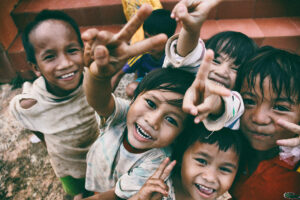Greatness of spirit

“To nurture a better tomorrow, we need to strengthen the child protection in our country.” — Dr. Bernadette J. Madrid, Ramon Magsaysay Laureate 2022.
The 14th annual Ako Para Sa Bata (APSB) conference opened at the Magsaysay Center with an inspiring lecture by Dr. Madrid, the champion for child protection.
Present onstage were panelists and speakers: Emily Abrera, Trustee of the Ramon Magsaysay Awards Foundation; Mariella S. Castillo, MD, Consuelo Foundation Managing Director; Dr. Shantha Sinha, 2003 Ramon Magsaysay Awardee, India (who participated via Zoom); Patricia Lim Ah Ken, Chief of Child Protection, UNICEF Philippines; Stella G. Manalo, MD, Conference Chair, APSB; Carmencita D. Padilla, MD, Chancellor UP Manila. And Integrated Bar of the Philippines representatives who signed a memorandum of agreement (MOA) with the Child Protection Network (CPN).
“[There are] certain formal and informal structures, functions and capacities that have been assembled to prevent and respond to violence, abuse, neglect, and exploitation of children. A child protection system is to be comprised of the following components:
“Human resources, finance, laws and policies, governance, monitoring and data collection as well as protection and response services and care management.
“It also includes different actors — children, families, those working at sub-national or national level and those working internationally. Most important are the relationships and interactions between and among these components and these actors within the system. It is the outcomes of these interactions that comprise the system.” (UNICEF 2021)
The Philippine National Baseline Study on Violence against Children (CWC, 2016) reveals that 80% of Filipino children have experienced violence. Physical, emotional abuse and bullying affect three out of five children. Sexual violence: one out of five children.
“Beyond the numbers, this is about the needless suffering of our children. A moral disgrace and the consequences are borne by this generation and the next,” Dr. Madrid remarked.
“I will share with you the lessons we have learned the past 25 years — my personal experiences as a pediatrician and Head of the Child Protection Unit at the Philippine General Hospital (CPU-PGH) of the University of the Philippines Manila and as Executive Director of the Child Protection Network Foundation, that led to the strengthening of the child protection system.
“Child protection does not really have a concrete identity for government such as health, education, justice….
“In a developing country like the Philippines there will always be competing priorities because there are not enough resources even for basic needs.
“We identified the Department of Health as the best fit because it already has the personnel for a multidisciplinary team of doctors, social workers and mental health providers. Health is the gateway for so many victims of violence. It is a natural entry point for receiving care, especially for those who are ready to disclose abuse. It has the capacity for both intervention and prevention work and data collection…”
The Department of Health Order in the establishment of Women and Children Protection Units (WCPUs) in all government hospitals is a major achievement.
Dr. Madrid enumerated additional challenges:
1. “Convincing the health sector, including the Department of Health, that violence against women and children is a public health concern.
2. “Making sure that the WCPUs is an adaptive general response mechanism to violence against women and children.
3. “Expansion of the team to include legal service”
At the conference, the memorandum of agreement with the IBP was signed by CPN’s Executive Director Dr. Bernadette J. Madrid, Katrina Legarda, National Director of the National Network of WCPUs, and IBP’s Marienne M. Ibadlit, National Director on Gender and Development, and Myline Urmenita-Palisoc, Deputy Director on National Center for Legal Aid.
4. “Mental Health Gap. Our patients need a spectrum of mental health services from acute to long term. More abused adolescents are at high risk for suicide (during the pandemic.) Telepsychiatry is a strategy.”
She mentioned the development services for all children and adults regardless of gender. What about the boys? LGBTQI +?
There is a need to strengthen the children and women protection workforce, from social service to health, to legal, to education. Training programs now include doctors, social workers, police, the judiciary and the barangay.
“Multidisciplinary training is important because we all must learn how to work together.”
Trainers should have the expertise and specialized training based on Clinical Practice guidelines and peer-review that is being institutionalized.
“Convincing the Education sector that in order to learn, children need to be protected from violence. Our experience shows that so many children drop out of school or do poorly in school because of violence that they have experienced at home or in school.”
Based on research, globally, the potential loss in human capital wealth due to violence in school is $11 trillion for 2019.
There are changing norms and practices.
“We found that the messenger is as important as the message,” she emphasized.
There is a carefully designed competency and skills-based training to sensitize our family judges and personnel handling child witnesses and victims of abuse.
Violence against children can be prevented. INSPIRE (WHO, 2016) are evidence-based prevention and response interventions that are scientifically evaluated. “Masayang Pamilya” is a controlled study Filipino adaptation of the Parenting for Lifelong Health Program. It showed reduced child maltreatment, emotional abuse and neglect in families.
Dr. Madrid shared her personal thoughts.
“It has been 25 years. System strengthening takes a long time…. We are in the frontlines. Witnessing what is happening with our children… and what they experience when they go through the system. We feel their pain. That is what guides us in all that we do.
“It is also about relationships… We would never have made a difference without all the partnerships. The support that was unstintingly given by people who do not even want to be known. We are members of a community that protects all children and hold each other’s hands when it is needed. I take this opportunity to thank you.
“We all know that we serve a purpose greater than ourselves.”
It took a foreigner who came here when he was a young man to start all of this. His name is David Bradley. After 25 years, he is still with us. He leads the CPN Foundation board that works quietly and effectively.
“Greatness of spirit comes in many forms. I consider myself blessed to experience it every day. Our children deserve nothing less.”
Warm congratulations, Dr. Bernadette J. Madrid and CPN.
Happy 25th Anniversary to CPU-PGH!
The “Ako Para Sa Bata” conference meetings, with the theme “The Beginning, the Building and the Institution in the Philippines,” are being held every Thursday until Nov. 24 at 10-11:30 a.m. via Zoom and Face Book Live. Registration is free. Register online at bit.ly/akoparasabata2022. Follow @AkoParaSaBataConference on FB for updates and announcements.
Maria Victoria Rufino is an artist, writer and businesswoman. She is president and executive producer of Maverick Productions.




